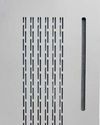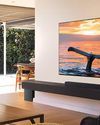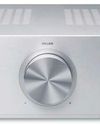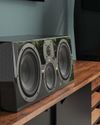
How many people know that the A/V receiver manufacturers do pretty much the same thing? Much like a car, an A/V receiver is built on a platform, one that can be upgraded and modified over time as new features are added. But there eventually comes a point where the only practical way forward is to start fresh with a clean-sheet design. That’s where Yamaha’s latest mid-priced RX-V receiver line comes in.
Launched with just two models, the RX-V4A ($440) and RX-V6A ($600), the subject of this review, these all-new receivers offer a fresh design aesthetic, with just two major controls visible on the front panel. Like earlier RX-V series models, The RX-V6A has a composite front panel, and there are rounded side corners to soften the look. A huge central volume knob dominates the front, with a smaller multi-function knob on the right side. No display is visible until you turn on the power, when an LCD display screen lights up. A row of hidden touch switches running along the lower edge gives instant access to programmable scene settings and other minor controls. The main power switch, a 1/4-inch headphone output, A USB type-A port, and a socket for the supplied YPAO (Yamaha Parametric Room Acoustic Optimizer) mic round out the front panel’s feature set.
FEATURES
Designing a $600 A/V receiver is a delicate balancing act where you have to determine the best blend of performance and features to meet the needs of users. It’s also important to be forward-thinking and anticipate what future tech developments are headed down the pike. The RX-V6A shows a lot of this type of planning, with several highly anticipated features promised through upcoming firmware updates.
This story is from the February - March 2021 edition of Sound & Vision.
Start your 7-day Magzter GOLD free trial to access thousands of curated premium stories, and 9,000+ magazines and newspapers.
Already a subscriber ? Sign In
This story is from the February - March 2021 edition of Sound & Vision.
Start your 7-day Magzter GOLD free trial to access thousands of curated premium stories, and 9,000+ magazines and newspapers.
Already a subscriber? Sign In

The Big Clean
Chances are you probably do not think about the state of your electronic devices too often. Oh, you might think about all the upgrades you would like to make; where you would put those new tower speakers, or how a second or third subwoofer would really tame those bass modes in your room, or how much more cinematic a larger screen would be. Sure, you think about that part of your system. But how often do you think about the well-being of your system?

Planar-Magnetic Attraction
THE DIPTYQUE DP 115 speakers are a new model 2-way, ribbon, and planar magnetic driver dipole \"isodynamic\" speaker system designed and built in France.

Full-Featured 4K
THE QN95D is one of two televisions we went hands-on with on a recent trip to Samsung's New Jersey QA Lab, the other being the S95D quantum-dot OLED.

Party Animal
FOR ANY party, the Soundcore Boom 2 Plus Outdoor Bass Bluetooth Speaker is an essential invite.

It's the End of the World. How About Popcorn and a Movie?
Attention all preppers! Today's column is right up your alley-or, more precisely-your tunnel to your underground bunker.

Bridging the Analog-Digital Gap on a Recliner
When I shopped for a motorized recliner, I rejected models with their own Internet Protocol address and built-in speakers. No need. I had already placed a smart speaker on an étagère beside the space where I had planned to put the chair. I'd have a smartphone in my hand and the room would be bathed in Wi-Fi.

BACK TO THE GARDEN
AN AQUARIAN EXPOSITION in WHITE LAKE, N.Y.

Big Sound, Small Price
DOLBY ATMOS, once a costly premium, is enjoying a surge of popularity across a range of new audio gear.

Classic Sound with Streaming Smarts
THE TWENTIETH century had its Roaring Twenties; welcome to the twenty-first's Streaming Twenties.

Stand and Deliver
IT DOESN'T seem all that long ago that SVS first entered the audio scene.